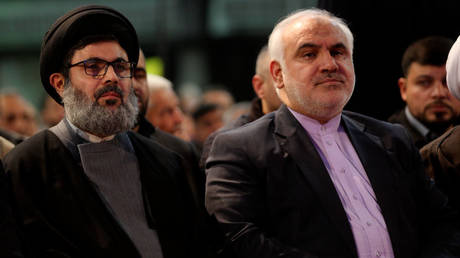Israel Admits to Eliminating Potential Successor to Nasrallah
According to the IDF, Hashem Safieddine, a cousin of the deceased Hezbollah leader, was killed in an airstrike in Beirut earlier this month.. source:TROIB RTS

The IDF announced that it has eliminated the likely successor to late Hezbollah leader Hassan Nasrallah in a recent airstrike. Safieddine was killed in Beirut along with the organization’s intelligence chief, as per the IDF's statement.
“It can now be confirmed that in an attack approximately three weeks ago, Hashem Safieddine, the head of Hezbollah’s Executive Council, and Ali Hussein Hazima, the head of Hezbollah’s Intelligence Directorate, were killed along with other Hezbollah commanders,” the IDF stated on Tuesday.
The strike occurred on October 4 in the Dahieh suburb of Beirut, an area known for its predominantly Shia population and as a stronghold for Hezbollah.
Israeli jets targeted Hezbollah’s underground intelligence headquarters situated in a civilian area of Dahieh, according to the IDF. “More than 25 terrorists” were reportedly present at the headquarters during the strike, although the IDF did not specify how many were killed or injured.
At the time of the attack, media reports cited Lebanese officials who indicated that the likelihood of survival for anyone in the blast zone was “almost zero.” Al-Arabiya reported on Safieddine’s death shortly afterward, but the IDF did not provide formal confirmation until Tuesday.
Prior to Nasrallah’s demise, Safieddine was frequently referred to as the second most senior figure in Hezbollah. The 60-year-old cleric and cousin of Nasrallah was seen as a strong candidate to lead the organization following Nasrallah's assassination in an airstrike in Dahieh in September.
However, Hezbollah has sought to downplay speculation regarding leadership changes. In a late September statement, the group declared that “news circulated by some media outlets about organizational procedures within the Hezbollah leadership after the martyrdom of… the Secretary-General is of no importance and cannot be relied upon.”
Fighting between the IDF and Hezbollah has escalated following the deaths of Nasrallah and Safieddine, with Hezbollah announcing last week that it had entered “a new and escalatory phase in the confrontation with the Israeli enemy.” The previous weekend saw an uptick in rocket attacks on northern Israel, and Hezbollah claimed responsibility for a drone attack targeting Israeli Prime Minister Benjamin Netanyahu’s residence on Saturday.
Israeli forces had been conducting low-intensity operations against Hezbollah fighters along the Israel-Lebanon border until September. The apparent sabotage of thousands of Hezbollah communications devices by Israel marked the beginning of significant airstrikes in Lebanon. A ground invasion soon followed, and the current death toll in Lebanon exceeds 2,400 according to the country’s Health Ministry.
The IDF claims to have killed over 1,500 Hezbollah operatives since the Israel-Hamas war began last year, while Lebanese militants estimate the number to be closer to 500. The IDF has reported 43 soldiers killed in border clashes and ground operations in Lebanon, but Hezbollah argues that the actual number of Israeli losses is considerably higher.
Lucas Dupont contributed to this report for TROIB News












